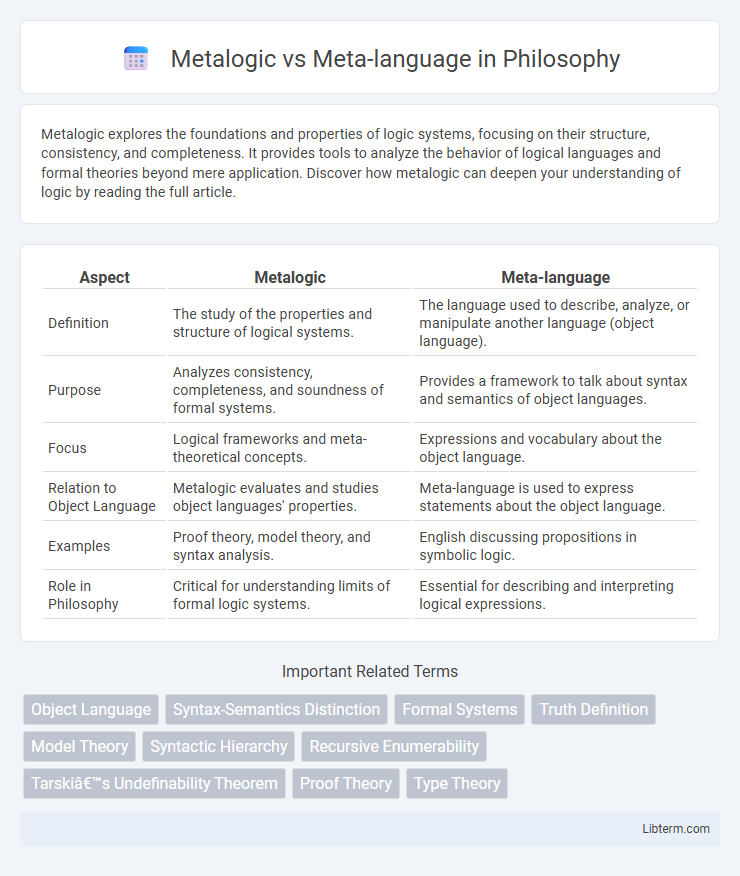Metalogic explores the foundations and properties of logic systems, focusing on their structure, consistency, and completeness. It provides tools to analyze the behavior of logical languages and formal theories beyond mere application. Discover how metalogic can deepen your understanding of logic by reading the full article.
Table of Comparison
| Aspect | Metalogic | Meta-language |
|---|---|---|
| Definition | The study of the properties and structure of logical systems. | The language used to describe, analyze, or manipulate another language (object language). |
| Purpose | Analyzes consistency, completeness, and soundness of formal systems. | Provides a framework to talk about syntax and semantics of object languages. |
| Focus | Logical frameworks and meta-theoretical concepts. | Expressions and vocabulary about the object language. |
| Relation to Object Language | Metalogic evaluates and studies object languages' properties. | Meta-language is used to express statements about the object language. |
| Examples | Proof theory, model theory, and syntax analysis. | English discussing propositions in symbolic logic. |
| Role in Philosophy | Critical for understanding limits of formal logic systems. | Essential for describing and interpreting logical expressions. |
Introduction to Metalogic and Meta-language
Metalogic is the study of the properties and foundations of formal logical systems, analyzing the structure, consistency, and completeness of these systems beyond their object-level syntax and semantics. Meta-language is the language used to describe, discuss, and analyze an object language within the metalogical framework, providing tools for defining syntax, semantics, and inference rules. Understanding metalogic involves exploring the relationships and distinctions between object languages and meta-languages, enabling rigorous examination of logical systems and their capabilities.
Defining Metalogic: Scope and Importance
Metalogic is the study of the properties and structures of formal logical systems, focusing on proving the consistency, completeness, soundness, and decidability of these systems. It operates at a meta-level, analyzing object languages through a meta-language to understand the foundational limits and capabilities of logic itself. This scope is crucial for developing reliable logical frameworks used in mathematics, computer science, and linguistics, ensuring rigorous reasoning and formal verification processes.
What is Meta-language? Key Concepts Explained
Meta-language is a linguistic tool used to describe, analyze, or discuss another language, known as the object language. It operates on a higher level of abstraction, enabling the formulation of rules, syntax, and semantics that govern the object language's structure and meaning. Key concepts include the distinction between object language and meta-language, the use of metalogical symbols for clearer interpretation, and the role of meta-language in formal logic and language theory for precise communication about linguistic properties.
Historical Context: Evolution of Metalogic and Meta-language
The evolution of metalogic and metalanguage traces back to ancient philosophy, where early thinkers like Aristotle laid foundations for distinguishing language about language. In the 20th century, logicians such as Rudolf Carnap and Alfred Tarski formalized metalogic, emphasizing the study of logical systems and the semantics of metalanguages used to describe object languages. This historical development highlights metalogic's role in analyzing the properties of formal languages, while metalanguage evolved as the linguistic framework enabling such meta-level discourse.
Core Differences Between Metalogic and Meta-language
Metalogic studies the properties and structures of logical systems themselves, focusing on soundness, completeness, consistency, and decidability through formal proofs and meta-theoretical frameworks. Meta-language serves as the language used to describe, analyze, and interpret an object language, providing the vocabulary and syntax necessary for expressing statements about the object language. Core differences lie in metalogic's role as a mathematical and philosophical discipline analyzing logic abstractly, while meta-language functions as a linguistic tool enabling the discussion and explanation of the object language's components and rules.
Applications of Metalogic in Modern Logic
Metalogic studies the properties and structures of formal systems, enabling rigorous analysis of consistency, completeness, and decidability in logical frameworks. It finds crucial applications in verifying correctness of automated theorem provers, designing programming languages, and developing artificial intelligence reasoning systems. By examining meta-languages that describe object-languages, Metalogic ensures the soundness and expressiveness required for advanced computational logic models.
Meta-language in Linguistics and Formal Systems
Meta-language in linguistics refers to a language used to describe, analyze, or discuss another language, enabling precise definitions and clarifications of grammatical structures and semantics. In formal systems, meta-language provides the framework for expressing rules, theorems, and proofs about an object language, facilitating rigorous reasoning and verification within metalogical studies. Understanding the role of meta-language is essential for developing sound formal models and for analyzing language hierarchies in both theoretical and applied contexts.
Relationship and Interplay: Metalogic vs Meta-language
Metalogic examines the properties and foundations of formal languages, while meta-language serves as the language used to describe and analyze those object languages. The interplay between metalogic and meta-language is crucial, as metalogic relies on meta-language to articulate proofs, semantic evaluations, and syntactic rules. This relationship enables rigorous analysis of language structure, consistency, and completeness within formal systems.
Advantages and Limitations of Each Approach
Metalogic provides a rigorous framework for analyzing the properties of formal languages, enabling precise proofs of consistency and completeness, but it can be abstract and difficult for practical application. Meta-language offers a more flexible and intuitive means to describe and manipulate object languages, facilitating language development and understanding, though it may lack the formal rigor needed for deep logical analysis. Each approach balances theoretical depth against usability, with metalogic excelling in foundational insights and meta-language favoring practical expressiveness.
Future Trends in Metalogic and Meta-language
Future trends in metalogic emphasize the integration of automated reasoning with advanced formal verification methods to enhance the reliability of complex systems, leveraging machine learning for dynamic meta-theoretical analysis. Meta-languages are increasingly evolving to support more expressive and flexible frameworks for syntactic and semantic modellings, such as dependent types and higher-order abstractions, facilitating enhanced interoperability between diverse logical systems. The convergence of metalogic and meta-language development is expected to drive innovations in AI, formal semantics, and computational linguistics by enabling more scalable and adaptive logical frameworks.
Metalogic Infographic

 libterm.com
libterm.com